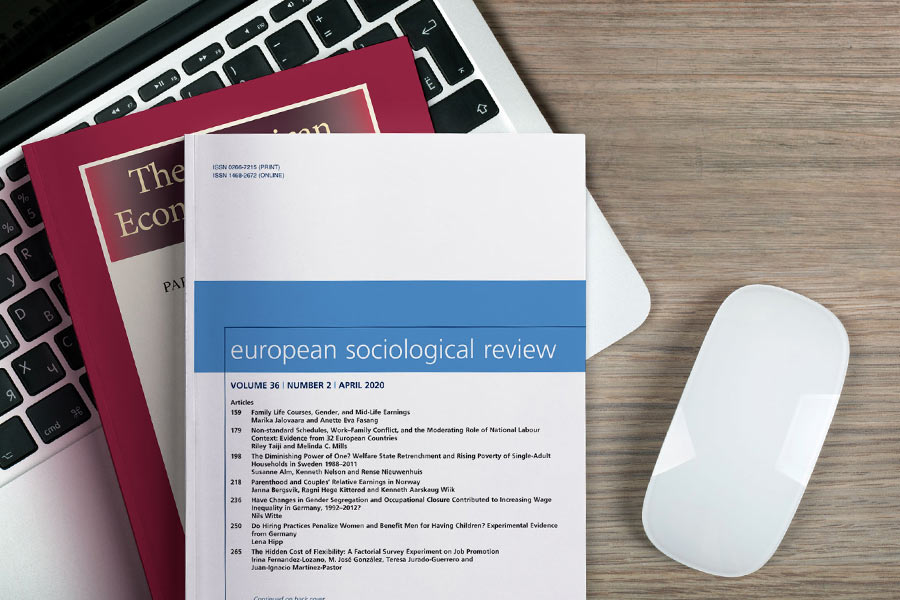Total hits 17.461
-
Welche Unterstützung benötigen Menschen mit psychischen Erkrankungen für ihre berufliche Rehabilitation?
Rauch, A. & Reims, N. (2025): Welche Unterstützung benötigen Menschen mit psychischen Erkrankungen für ihre berufliche Rehabilitation? In: IAB-Forum No. 20.02.2025. DOI:10.48720/IAB.FOO.20250220.01
-
Auswirkungen des Strukturwandels auf die Arbeitsmarktregionen und Bundesländer in der langen Frist – Qualifikations- und Berufsprojektion bis 2040
Schneemann, C., Bernardt, F., Kalinowski, M., Maier, T., Zika, G. & Wolter, M. (2025): Auswirkungen des Strukturwandels auf die Arbeitsmarktregionen und Bundesländer in der langen Frist – Qualifikations- und Berufsprojektion bis 2040. (IAB-Forschungsbericht 03/2025), Nürnberg, 46 p. DOI:10.48720/IAB.FB.2503
-
Langfristprojektion bis 2040: "Fachkräfteengpässe trotz schlechterer konjunktureller Entwicklung" (Interview)
Keitel, C.; Zika, G. & Schneemann, C. (interviewed person) (2025): Langfristprojektion bis 2040: "Fachkräfteengpässe trotz schlechterer konjunktureller Entwicklung" (Interview). In: IAB-Forum No. 19.02.2025. DOI:10.48720/IAB.FOO.20250219.01
-
ELMI Policy Talk: Immigrant integration services in Germany, Sweden and Finland (Interview)
Latner, J.; Forslund, A., Konle-Seidl, R. & Hämäläinen, K. (sonst. bet. Pers.) (2025): ELMI Policy Talk: Immigrant integration services in Germany, Sweden and Finland (Interview). In: IAB-Forum No. 19.02.2025. DOI:10.48720/IAB.FOO.20250219.02
-
20 Jahre Grundsicherung für Arbeitsuchende: Ein Sicherungssystem in Bewegung
Gellermann, J., Penz, R. & Ramos Lobato, P. (2025): 20 Jahre Grundsicherung für Arbeitsuchende: Ein Sicherungssystem in Bewegung. In: IAB-Forum – Grafik aktuell No. 18.02.2025. DOI:10.48720/IAB.FOO.GA.20250218.01
-
Weather effects on unemployment
Söhnlein, D. & Weber, E. (2025): Wettereffekte auf die Arbeitslosigkeit. Stand: Februar 2025. (Institut für Arbeitsmarkt- und Berufsforschung. Aktuelle Daten und Indikatoren), Nürnberg, 6 p.
-
Labour and Competitiveness in Germany: Embracing the Transformation to Boost Productivity
Fitzenberger, B. & Kagerl, C. (2025): Labour and Competitiveness in Germany: Embracing the Transformation to Boost Productivity. In: Intereconomics, Vol. 60, No. 1, p. 28-33. DOI:10.2478/ie-2025-0006
-
Generation Z - noch ein Klischee weniger
Hellwagner, T. & Weber, E. (2025): Generation Z - noch ein Klischee weniger. In: IAB-Forum No. 17.02.2025. DOI:10.48720/IAB.FOO.20250217.01
-
Sanktionen in der Grundsicherung
Wolf, M. (2025): Sanktionen in der Grundsicherung. Aktuelle Entwicklung und empirische Befunde. In: Aus Politik und Zeitgeschichte, Vol. 39, No. 8-9, p. 39-44.
-
Machbarkeitsstudie Weiterentwicklung Betriebsbefragungen
Bellmann, L., Gürtzgen, N., Hensgen, S., Kohaut, S., Kubis, A., Oberfichtner, M. & Pirralha, A. (2025): Machbarkeitsstudie Weiterentwicklung Betriebsbefragungen. Teilprojekt des BMAS-Projekts zur „Förderung innovativer Ansätze zur Stärkung von Dateninfrastruktur und Methoden“. (IAB-Forschungsbericht 02/2025), Nürnberg, 124 p. DOI:10.48720/IAB.FB.2502
-
Arbeitsmarktintegration ukrainischer Geflüchteter
Kosyakova, Y., Brücker, H. & Koch, M. (2025): Arbeitsmarktintegration ukrainischer Geflüchteter. Berlin.
-
Arbeitsmarktintegration nicht-ukrainischer Geflüchteter
Brücker, H., Kosyakova, Y. & Koch, M. (2025): Arbeitsmarktintegration nicht-ukrainischer Geflüchteter. Starker Anstieg der Erwerbstätigenquoten mit zunehmender Aufenthaltsdauer. Berlin.
-
Changes in conscientiousness during adolescence – the role of intelligence
Friedrich, T. & Schütz, A. (2025): Changes in conscientiousness during adolescence – the role of intelligence. In: Personality Science, Vol. 6. DOI:10.1177/27000710241309790
-
Forschung und Politikberatung benötigen ein Forschungsdatengesetz: Lehren aus dem IAB
Fitzenberger, B. & Müller, D. (2025): Forschung und Politikberatung benötigen ein Forschungsdatengesetz: Lehren aus dem IAB. In: IAB-Forum No. 13.02.2025. DOI:10.48720/IAB.FOO.20250213.01
-
Wenn Ihr Job von KI betroffen ist, kann das eine große Chance sein
Weber, E. (2025): Wenn Ihr Job von KI betroffen ist, kann das eine große Chance sein. Gastbeitrag. In: Frankfurter Allgemeine Zeitung No. 12.02.2025 Frankfurt am Main.
-
Bürgergeld: Kooperation statt Aktivierung? Konzeptionelle Einordnung und erste Bewertungen
Dietz, M. (2025): Bürgergeld: Kooperation statt Aktivierung? Konzeptionelle Einordnung und erste Bewertungen. In: Archiv für Wissenschaft und Praxis der sozialen Arbeit, Vol. 56, No. 1, p. 16-27.
-
Ältere gehen im Westen später in Rente als im Osten und auf dem Land früher als in Städten
Dauth, W. & Hirschenauer, F. (2025): Ältere gehen im Westen später in Rente als im Osten und auf dem Land früher als in Städten. In: IAB-Forum No. 11.02.2025. DOI:10.48720/IAB.FOO.20250211.01
-
Betriebliche Aus- und Weiterbildung als Strategien der Fachkräftesicherung
Leber, U. & Schwengler, B. (2025): Betriebliche Aus- und Weiterbildung als Strategien der Fachkräftesicherung. In: Berufsbildung in Wissenschaft und Praxis, Vol. 54, No. 1, p. 8-12.
-
Welche Betriebe nehmen die Weiterbildungsförderung der BA in Anspruch?
Leber, U. (2025): Welche Betriebe nehmen die Weiterbildungsförderung der BA in Anspruch? In: Denk-doch-Mal.de No. 1.
-
Multivariate assessment of interviewer errors in a cross-national economic survey and the role of fieldwork institutes
Olbrich, L., Beckmann, E. & Sakshaug, J. (2026): Multivariate assessment of interviewer errors in a cross-national economic survey and the role of fieldwork institutes. In: Journal of the Royal Statistical Society. Series A, Statistics in Society, Vol. 189, No. 1, p. 561-580. DOI:10.1093/jrsssa/qnaf006



